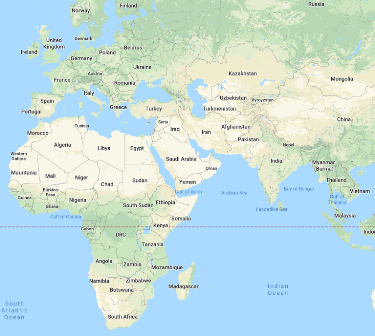
Energy/Automotive News| WTI Crude $82.22/bbl, Brent $86.84/bbl, Natural Gas $1.76/MMBtu
London, 18 April 2024, (Oilandgaspress):- Crude oil prices remained under pressure today despite the news that the U.S. will reimpose oil sanctions on Venezuela after a six-month pause. Countering this development, the EIA on Wednesday reported another weekly build in crude oil inventories that weighed on benchmarks as it brought the total oil in stock to the highest since June 2023, according to Bloomberg.. Read More

The Uganda National Oil Company (UNOC) proudly announces the appointment of Tony Otoa as its new Chief Corporate Affairs Officer, effective immediately. With over a decade of extensive experience in corporate communications, public relations, and stakeholder engagement, Mr Otoa brings a wealth of expertise to UNOC. As Chief Corporate Affairs Officer, he will play a pivotal role in enhancing UNOC’s reputation, fostering strategic partnerships, and advancing the company’s mission in Uganda’s burgeoning oil and gas sector.
“I am honored to join Uganda National Oil Company at such a pivotal time in the nation’s energy sector,” Mr Otoa said. “I look forward to collaborating with UNOC’s talented team to effectively communicate our vision, values, and contributions to Uganda’s socio-economic development.”
Prior to joining UNOC, Mr Otoa held various leadership positions in reputable organizations, where he successfully developed and implemented communication strategies that drove positive impact and organizational growth. His previous posts include being the Chief Executive of Stanbic Business Incubator and the Head of Public Affairs and Local Content at Total Energies. Mr Otea was also the Secretary General of the Uganda Parliamentary Press Association. In his new role, he will lead UNOC’s corporate affairs department, overseeing internal and external communications, government relations, media relations, and community engagement initiatives. He will work closely with UNOC’s leadership team to strengthen the company’s brand, promote transparency, and build sustainable relationships with stakeholders at local, national, and international levels. Mr Otoa holds a Bachelor’s degree in International Relations and a Master’s degree in International Law from Oxford Brookes University in the UK. . Read More

Mitsubishi Heavy Industries, Ltd. (MHI) and NGK INSULATORS, LTD. (NGK) will jointly develop a hydrogen purification system that uses membrane separation to purify from hydrogen-nitrogen mixture gas after ammonia cracking. The companies expect the technology to contribute to the establishment of a hydrogen and ammonia supply chain enabling high-volume transport. This joint project aims to build an optimal system for purifying hydrogen using membrane separation from the mixed gas of hydrogen and nitrogen after ammonia cracking. MHI will contribute its significant global expertise delivering ammonia plants and other chemical plants, and its technologies for handling ammonia and hydrogen. NGK will contribute its deep knowledge of subnano ceramic membrane technology and unique film deposition technology developed in the fields of chemical processes and water purification, namely, the world’s largest ceramic membranes, which are known for their exceptional separation accuracy and durability. MHI and NGK are committed to driving the development forward, aiming to achieve early commercialization.
Ammonia is garnering attention today as a hydrogen carrier that enables safe transport and storage of hydrogen, a fuel that emits no CO2 when combusted, in large volumes over great distances. Plans to establish supply chains are underway worldwide, notably in Europe, while in Japan a “Fuel Ammonia Supply Chain Establishment” project is in progress. This market is expected to grow in the years ahead. Read More

Petrobras’ Executive Board approved, in a meeting held today (17/4), the transfer of its entire stake in the Cherne and Bagre fields, located in shallow waters in the Campos Basin, to Perenco Petróleo e Gás do Brasil Ltda ( Perenco). Production from both fields was halted in March 2020 and the respective platforms have been in hibernation since then.
The amount to be received by Petrobras from the operation is US$10 million,
with US$1 million paid on the date of signing the contract for the transfer of assets and the remainder at the closing of the transaction, subject to the adjustments provided for in the contract.
The transfer of these fields to Perenco brings the prospect of resumption of production by the new operator, configuring a more advantageous alternative for Petrobras compared to the option of decommissioning the facilities and returning the concessions to the ANP. At the same time, this transaction allows Petrobras to direct its investments in the E&P segment to assets that are more in line with the company’s strategy, which involves, among other factors, the increasing decarbonization of operations. There will be no loss or transfer of any Petrobras employee as a result of the transfer of assets, since the majority of workers who worked in the operation have already been reallocated to other company activities. The minimum staff maintained to maintain the hibernated assets will integrate other operations after the transfer of the fields is completed. . Read More
.Petrobras informs, in continuation of the Relevant Fact of 04/11/2024, that the Hon. Mr. Judge Rapporteur of the 4th Panel of the Federal Regional Court of the 3rd Region issued a decision today suspending the effects of the decision that suspended Mr. Pietro Adamo Sampaio Mendes from holding the position of Board of Directors of the Company within the scope of a popular action underway in the 21st Federal Civil Court of São Paulo.
Petrobras will continue to defend the soundness of its internal governance procedures.
Facts deemed relevant on the topic will be disclosed to the market in a timely manner. Read More
Petrobras received the Latin America Bond Award s, offered by Global Capital, which recognizes the most important institutions and financial operations in the Latin American market, in the Quasi- Sovereign Bond Deal of the Year category ), for the issuance of global bonds carried out in July 2023. The category includes negotiations involving quasi-sovereign bonds (issued by state-owned companies or companies that have the State as a shareholder or controller).
The US$1.25 billion issuance had great repercussions in the market, reaching a demand of US$6.4 billion, five times the value of the offer. In the end, more than 300 investors from various parts of the world joined the offer, which was announced at a time when the company completed two years without entering the debt market.
For Sérgio Caetano Leite, financial and investor relations director at Petrobras, this represents recognition of Petrobras as a reliable company by investors. “The issuance of these bonds, which exceeded our expectations, and the award for this operation reinforce the market’s confidence in the new management and in the Company’s financial indicators”, he highlights. The same operation had already been recognized in another award, from the GFC Media Group , in December 2023.
The issuance also stood out for the use of ESG criteria in choosing banks and the compression of rates, considered the largest in 2023 for an issuer in Latin America. The rate obtained was 6.625% per year, from a starting rate of 7.25%. The operation recorded the lowest spread (difference in relation to US Treasury rates) for a Petrobras issue in the last 10 years. Read More
Petrobras will begin studies to carry out investments with the objective of decarbonizing the Lubrificantes e Derivados do Nordeste (Lubnor) refinery, in Fortaleza (CE). The Director of Industrial Processes and Products at Petrobras, William França da Silva, explained that the studies will have resources from the Carbon Neutral Program, the company’s energy transition initiative. The announcement took place during the inauguration of the unit’s new general manager, engineer Alfredo Alle Andrade David, last Tuesday (9/4). Provided for in Petrobras’ Strategic Plan 2024-2028+ and being implemented in several of the company’s units, these projects aim to accelerate the identification and development of the best solutions for the company’s decarbonization. At Lubnor, the objective is to completely neutralize the refinery’s absolute emissions. Petrobras intends to replace the natural gas currently used by Lubnor in energy generation with biomethane. This fuel will also be used to produce hydrogen. The use of biomethane should reduce direct carbon dioxide emissions from the refinery by 100% (currently 60 thousand tons per year).
Lubnor will also start producing Biobunker, a marine fuel with renewable content, and CAP Pro, an asphalt with a lower environmental impact when applied. Furthermore, it will use renewable electrical energy in its processes, which should neutralize its indirect carbon dioxide emissions by 100%… Read full article
Petrobras, in a consortium with the companies CNOOC, CNODC and PPSA, reached a new milestone: the Búzios field reached 1 billion barrels of oil (bbl) produced. The feat was achieved on March 31st, and adds up to the production of the five units in operation in the largest field in the world in ultra-deep waters, the FPSOs P-74, P-75, P-76, P-77 and Almirante Barroso. Read full article

Petrobras became the first among the majors in the sector to definitively replace diving at high depths with underwater robots. The change made it possible to reduce risks to people and increase safety, by replacing saturated diving, carried out by divers at depths greater than 50 meters, with 100% diverless operations (without diving), which use only underwater robots. To give you an idea, in the past Petrobras has carried out, on average, 2 thousand saturated dives per year. The 100% diverless solution is another success story in the use of technologies to remove workers from complex activities and greater risk exposure. The new technological solution also increased the reliability in the activation of platform safety valves, with the change in the connection system to operate with robots and without diving. The company will continue to rely on divers for activities up to 50 meters deep and some of the professionals are also being migrated to work on diverless fronts and trained to operate underwater robots (this has been occurring, however the market has been making this movement based on interactions with Petrobras). Read full article

Just Stop Oil supporter Callum Goode has been released from HMP Wandsworth following their acquittal in the first ever trial for the offence of ‘Locking On,’ as defined in the new Public Order Act (Section 1). Callum has been imprisoned since the 6th March, without trial, after taking action to highlight the injustice of weaponizing civil injunctions against people demanding an end to oil and gas. [1] On Tuesday 16th April Callum appeared alongside Tez Burns, 35, before District Judge Minhas at City of London Magistrates’ Court, charged with causing ‘significant disruption’ under the Public Order Act. On the 6th March Callum and Tez glued their hands to the gate of the Royal Courts of Justice to highlight how injunctions are being used to silence those speaking out about climate inaction. [2] District Judge Minhas ruled that convicting Callum and Tez for a minor 15-minute delay to court proceedings at the Royal Courts of Justice, would be disproportionate. Goode has been imprisoned on remand since the 6th of March at HMP Pentonville and HMP Wandsworth. Read More

Increased private consumption and declining inflation are supporting an economic rebound in Sub-Saharan Africa. However, the recovery remains fragile due to uncertain global economic conditions, growing debt service obligations, frequent natural disasters, and escalating conflict and violence, according to the World Bank’s latest Africa’s Pulse report. Transformative policies are needed to address deep-rooted inequality to sustain long-term growth and effectively reduce poverty.
The report projects that growth will rebound in 2024, rising from a low of 2.6 percent in 2023 to 3.4 percent in 2024, and 3.8 percent in 2025. However, this recovery remains tenuous. While inflation is cooling across most economies, falling from a median of 7.1 to 5.1 percent in 2024, it remains high compared to pre-COVID-19 pandemic levels. Additionally, while growth of public debt is slowing, more than half of African governments grapple with external liquidity problems, and face unsustainable debt burdens.
Overall, the report underscores that despite the projected boost in growth, the pace of economic expansion in the region remains below the growth rate of the previous decade (2000-2014) and is insufficient to have a significant effect on poverty reduction. Moreover, due to multiple factors including structural inequality, economic growth reduces poverty in Sub-Saharan Africa less than in other regions.
“Per capita GDP growth of 1 percent is associated with a reduction in the extreme poverty rate of only about 1 percent in the region, compared to 2.5 percent on average in the rest of the world,” said Andrew Dabalen, World Bank Chief Economist for Africa. “In a context of constrained government budgets, faster poverty reduction will not be achieved through fiscal policy alone. It needs to be supported by policies that expand the productive capacity of the private sector to create more and better jobs for all segments of society.”
The report highlights that external resources to meet gross financing needs of African governments are shrinking and those available are costlier than they were prior to the pandemic. Political instability and geopolitical tensions weigh on economic activity and may constrain access to food for an estimated 105 million people at risk of food insecurity due to conflict and climate shocks. African governments’ fiscal positions remain vulnerable to global economic disruptions, necessitating policy actions to build buffers to prevent or cope with future shocks. Read More

The World Bank’s new Middle East and North Africa Economic Update, entitled Conflict and Debt in the Middle East and North Africa, shows that lackluster growth, rising indebtedness and heightened uncertainty due to the conflict in the Middle East are impacting economies across the region.
According to the report, MENA economies are expected to return to low growth akin to the decade prior to the pandemic. MENA’s gross domestic product (GDP) is forecast to rise to 2.7% in 2024, which is a tepid increase from 1.9% in 2023. As in 2023, oil importing and oil exporting countries are likely to grow at less disparate rates than 2022, when higher oil prices boosted growth in oil exporters. For Gulf Cooperation Council (GCC) countries, the 2024 growth uptick reflects expectations of robust non-oil sector activity and fading out of oil production cuts towards the end of the year. GDP growth in almost all oil importing countries is expected to decelerate.
The report looks at the economic impact of the conflict in the Middle East on the region. Economic activity in Gaza has come to a near standstill. The GDP of the Gaza strip dropped by 86% in last quarter of 2023. The West Bank has plunged into a recession, with simultaneous public and private sector crises. A recent World Bank report goes into further depth on damages to the Gaza Strip and catastrophic impacts on the people of Gaza.
The economic impact of the conflict on the rest of the region has remained relatively contained, but uncertainty has increased. For example, the shipping industry has coped with shocks to maritime transport by rerouting vessels away from the Red Sea, but any prolonged disruptions to routes through the Suez Canal could increase commodity prices regionally and globally. The report also looks at rising indebtedness in the MENA region. Between 2013 and 2019, the median debt-to-GDP ratio for MENA economies increased by more than 23 percentage points. The pandemic made things worse as declines in revenue, together with pandemic support spending, increased financing needs for many countries. This rising indebtedness is heavily concentrated in oil-importing economies, which now have a debt-to-GDP ratio 50 percent higher than the global average of emerging market and developing economies. Approaching 90 percent of GDP in 2023, oil-importing countries in MENA have a debt-to-GDP ratio almost three times higher than that of oil exporting countries in the region. The report presents evidence that oil-importing countries in MENA have been unable to grow out of debt or inflate their debt away, making fiscal discipline essential to curb indebtedness. Critically, off-budget items which have played a large role in some MENA economies have been to the detriment of debt and fiscal transparency. The challenge for oil exporters is one of economic and fiscal-revenue diversification, given the structural change in global oil markets and the rising demand for renewable sources of energy. Overall, MENA economies need to undertake structural reforms, chief among them transparency, to unlock growth and forge a sustainable path ahead. Read More
World Bank Group (WBG) and Brazil. Endorsed last week by the WBG Board of Directors and released the plan for the 2024-2028 period will guide the Group’s joint work to promote inclusive and sustainable development while tackling climate change in the country.
Developed in close coordination with the Brazilian government and many stakeholders, this strategic plan supports Brazil’s development priorities as laid out in its Pluriannual Plan (PPA) for 2024-2027 and the Ecological Transformation Plan (ETP). It also considers the ambitions of the Brazilian private sector to improve the country’s business environment and help companies excel on the global stage.
“The overarching goal of this strategy is to help Brazil build a more productive, more inclusive, and greener economy, including in the Amazon and other key biomes, while also supporting institutional governance and the reduction of racial and gender disparities in a systematic way,” said Johannes Zutt, World Bank director for Brazil. “Our activities will focus on promoting greater productivity and employment, inclusion of the poor and underserved populations, and a greener economy with reduced vulnerability to climate shocks.”

The strategy seeks to enhance productivity in Brazil, by addressing longstanding impediments towards developing a more competitive economy. This involves working to reduce the cost of doing business, expand access to finance, boost human capital, promote innovation and modern infrastructure (especially digital, transportation and logistics), as well as helping to attract private investment on all these fronts.
“Mobilizing private capital is at the center of our strategic plan in Brazil,” said Manuel Reyes-Retana, IFC Regional Director for Brazil, Ecuador, Peru, Bolivia, and the Southern Cone. “To ensure a sustainable and inclusive development, the private sector should play a key role, focusing on a productivity-oriented growth model, while also promoting innovation and helping the country reduce its emissions. The WBG will support the expansion of sustainable finance and capital market development to channel investments in sectors that are essential to support the country in its climate adaptation and mitigation strategy.”
To promote inclusion, the strategy will support policies to help the poorest realize more economic opportunities, through enhancing their access to high quality education, health care services, water and sanitation, and digital services, as well as supporting land tenure regulation in rural areas. The WBG will also support financial solutions for Women-Owned Small and Medium Enterprises (WMSE) with an additional focus on underserved businesses in the North and Northeast regions of Brazil.
Sustainability is a central goal in the new strategy, aiming to help Brazil realize its potential as a global climate leader. The strategy has an important focus on supporting policies and projects to expand Brazil’s clean energy matrix and to help rural producers withstand the impacts of climate change while ensuring sustainability and food security. The strategy also seeks to help industries and cities to reduce carbon emissions, curb illegal deforestation, improve the management of natural resources, establish taxonomies, and mobilize climate finance, such as through green and blue bonds and sustainability-linked instruments. Read More
The World Bank (International Bank for Reconstruction and Development, IBRD, Aaa/AAA) today priced a 3 billion Norwegian krone-denominated floating rate Sustainable Development Bond that matures on October 26, 2029. The bond offers a quarterly coupon of 3-month NIBOR + 19 bps and was priced at 100%. Nordea acted as sole lead manager for the transaction. The bonds were placed with Norwegian investors, with banks representing the majority share of allocations at 74%, followed by central banks and official institutions at 24%. The remainder was placed with insurance companies, pension funds and others.. Read More

Avaada Energy secured this significant capacity with a competitive tariff of ₹3.47 per kWh. The project will be connected to the Inter State Transmission System (ISTS), enabling efficient energy distribution throughout the country. Read more
India’s indigenous crude oil and condensate production in March 2024 reached 2.5 million metric tons (MMT), marking a 2.02% increase from March 2023, according to data from the Petroleum Planning and Analysis Cell (PPAC). Oil India Limited (OIL) reported production of 0.3 MMT, Oil and Natural Gas Corp (ONGC) produced 1.6 MMT, and production under Production Sharing Contracts (PSC) and Revenue Sharing Contracts (RSC) totaled 0.6 MMT. Read More
(Reuters) – Tesla (TSLA.O), opens new tab is laying off more than 10% of its global workforce, an internal memo seen by Reuters on Monday shows, as it grapples with falling sales and an intensifying price war for electric vehicles (EVs).
“About every five years, we need to reorganize and streamline the company for the next phase of growth,” CEO Elon Musk commented in a post on X. Two senior leaders, battery development chief Drew Baglino and vice president for public policy Rohan Patel, also announced their departures, drawing posts of thanks from Musk although some investors were concerned. Read More
(Reuters) – Tesla (TSLA.O), opens new tab on Wednesday asked shareholders to reaffirm their approval of CEO Elon Musk’s record-breaking $56 billion compensation that was set in 2018, but was rejected by a Delaware judge in January.
The re-vote comes ahead of next week’s quarterly earnings for Tesla, which is grappling with weak demand as well as a reputational hit to Musk from his political leanings and approval of an antisemitic conspiracy theory last year. Read More
| Oil and Gas Blends | Units | Oil Price US$/bbl | Change |
| Crude Oil (WTI) | USD/bbl | $82.19 | Down |
| Crude Oil (Brent) | USD/bbl | $86.81 | Down |
| Bonny Light | USD/bbl | $90.37 | Down |
| Saharan Blend | USD/bbl | $89.45 | Down |
| Natural Gas | USD/MMBtu | $1.75 | Up |
| Murban Crude | USD/bbl | $87.36 | Down |
| OPEC basket 17/04/24 | USD/bbl | $89.64 | Down |

Kia Corporation (Kia) has been honored at the 2024 Car Design Award ceremony, receiving the prestigious accolade for ‘Brand Design Language’.
As part of its much lauded brand relaunch, Kia unveiled its revolutionary new design philosophy, ‘Opposites United,’ in 2021. The design philosophy harnesses three energies – tension, harmony, and dynamism – to create fresh perspectives and develop new ideas inspired by the contradicting forces experienced in daily life.
Kia has been recognized for communicating consistent design directions by launching differentiated product designs under the ‘Opposites United’ design philosophy. In line with its vision to provide sustainable mobility solutions, the philosophy consolidates the design ideas and customer value throughout the Kia’s market-leading vehicles.
“With its Opposite United philosophy, Kia design has taken a non-conformist approach with the aim of inducing change, unafraid of taking risks. Unexpected at first sight, Kia’s new models break the mould with long-established aesthetic parameters to introduce a totally new and modern formal language. A relentless innovation to establish a new identity,” the juries of Car Design Award 2024 stated.
Among the Kia’s new vehicles that have recently been honored for their excellent design, EV9 won two of the world’s top three automobile awards, including the ‘2024 World Car of the Year’ and the ‘2024 North American Car, Utility and Truck of the Year’. Kia also won the iF Design Awards with EV9 taking prestigious Gold. Read full article
Hyundai Motor Group (the Group) has signed an agreement for strategic cooperation with Toray Industries, Inc., a pioneer in carbon fiber and composite material technology, to advance material innovation for a new era of mobility. Toray Industries specializes in fibers and textiles, performance chemicals, carbon fiber composite materials, environmental engineering and life science. Toray Industries is renowned for being the global leader in carbon fiber, a material widely adopted in advanced industries such as automotive and aviation due to its light weight, high strength, and heat resistance properties. From Toray Industries, Akihiro Nikkaku, Chairman; Mitsuo Ohya, President; Young-kwan Lee, Chairman of Toray Advanced Materials Korea attended the official ceremony to establish the foundation for joint research and development (R&D) and a long-term partnership. Representatives from the Group included Jaehoon Chang, President and CEO of Hyundai Motor Company; Ho Sung Song, President and CEO of Kia; Chang Song, President and Head of Advanced Vehicle Platform Division; and Heung-Soo Kim, Executive Vice President and Head of Global Strategy Office. Read more

The Defense Advanced Research Projects Agency, or DARPA, is a branch of the U.S. Department of Defense developing ambitious, outlandish aircraft designs, such as an airplane with no control surfaces or the Liberty Lifter seaplane. On Wednesday, the agency released critical details on what may be its most groundbreaking program so far.
For the past four years, DARPA has been developing its Air Combat Evolution (ACE) program, which seeks to team human pilots with AI and machine-learning systems in dogfighting scenarios. According to the agency, the initiative reached new heights in September with the first AI-versus-human dogfight conducted with actual aircraft.. Read full article
Baker Hughes Rig Count: : U.S. -3 to 617 Canada +5 to 141
U.S. Rig Count is down 3 from last week to 617 with oil rigs down 2 to 506, gas rigs down 1 to 109 and miscellaneous rigs unchanged at 2.
Canada Rig Count is up 5 from last week to 141, with oil rigs up 5 to 70, and gas rigs unchanged at 71.
International Rig Count is up 13 rigs from last month to 971 with land rigs up 1 to 736, offshore rigs up 12 to 235.
The Worldwide Rig Count for March was 1,793, down 20 from the 1,813 counted in February 2024, and down 86,from the 1,878 counted in March 2023.
| Region | Period | Rig Count | Change |
| U.S.A | 12 April 2024 | 617 | -3 |
| Canada | 12 April 2024 | 141 | +5 |
| International | March 2024 | 971. | +13 |

Oil and Gas News Undiluted !!! �The squeaky wheel gets the oil�
OilandGasPress Energy Newsbites and Analysis Roundup | Compiled by: OGP Staff, Segun Cole @oilandgaspress.
Disclaimer: News articles reported on OilAndGasPress are a reflection of what is published in the media. OilAndGasPress is not in a position to verify the accuracy of daily news articles. The materials provided are for informational and educational purposes only and are not intended to provide tax, legal, or investment advice.
Information posted is accurate at the time of posting, but may be superseded by subsequent press releases
Please email us your industry related news for publication info@OilAndGasPress.com
Follow us: @OilAndGasPress on Twitter |
Oil and gas press covers, Energy Monitor, Climate, Renewable, Wind, Biomass, Sustainability, Oil Price, LPG, Solar, Marine, Aviation, Fuel, Hydrogen, Electric ,EV, Gas,
Subscribe to Oil, Gas, Energy News Release Service


